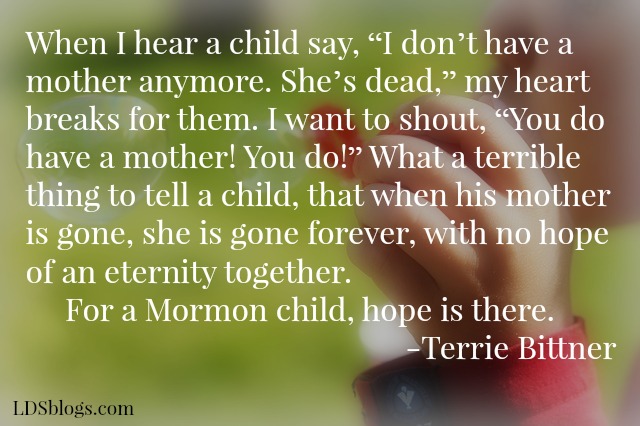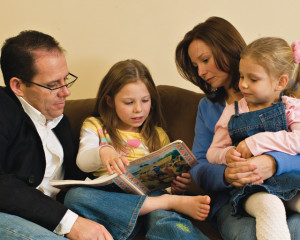While reading a comment on someone’s blog, I noted that a person who was not Mormon thought it was unkind of Mormons to teach that eternal families are possible only for those who make good choices in life. I thought it was an odd comment, since every other religion that I’m aware of teaches that children will not have their families after death no matter what choices they make—divorce and child surrendering are mandatory. We are the only faith I know of that gives children hope of having their families forever. Young children are normally just taught that families are meant to be forever; older children learn more details as they are ready for them
When I hear a child say, “I don’t have a mother anymore. She’s dead,” my heart breaks for them. I want to shout, “You do have a mother! You do!” What a terrible thing to tell a child, that when his mother is gone, she is gone forever, with no hope of an eternity together. For a Mormon child, hope is there.
“Several years ago, the Salt Lake City newspapers published an obituary notice of a close friend—a mother and wife taken by death in the prime of her life. I visited the mortuary and joined a host of persons gathered to express condolence to the distraught husband and motherless children. Suddenly the smallest child, Kelly, recognized me and took my hand in hers. “Come with me,” she said, and she led me to the casket in which rested the body of her beloved mother. “I’m not crying,” she said, “and neither must you. Many times my mommy told me about death and life with Heavenly Father. I belong to my mommy and my daddy. We’ll all be together again.” To my mind came the words of the Psalmist: “Out of the mouth of babes … hast thou ordained strength.” (Ps. 8:2.) (Thomas S. Monson, Hopeless Dawn—Joyful Morning, April, 1976).
I love that we give children a sense of security in their very hardest moments of family loss. I’ve taught many little children who have experienced the deaths of people they loved, and while they cried and were sad, they spoke happily of their joy in knowing it wouldn’t be forever.
Because I have three children and because I most often teach children at church, I have become especially aware of the gospel teachings that children find most comforting and rewarding. Following are additional teachings the children in my life have loved.
Heavenly Father and Jesus Love Me
Each year, Mormon children are taught that they are children of a Heavenly Father who loves them with all His heart. They learn that Jesus also loves them with all His heart. We teach them that God knows them personally because they used to live with Him before they were born and that He used that knowledge He gained of them to make a special plan. While there is an overall plan of salvation for everyone, there is also a very personal plan for each of us individually. Children often mention that this makes them feel very special—there have been so many people on the Earth, and yet God took the time to make a plan just for them.
They learned that Jesus could have lived forever and that He would never have to pay the price of sin because He was perfect. However, He chose to take our sins on Himself and pay the price, suffering beyond our ability to understand—and He did it because He loves us. When I teach this to children, I name each child individually. “Jesus did this for Jamey. Jesus did this for Samuel.” I want them to understand that it wasn’t a group atonement—it was personal for them. When I ask them how that makes them feel, they always say they feel special and important and loved.
My Life Has a Purpose
The world too often seems to like to teach children that everything is random, meaningless, and temporary. This is unsettling to children, who like things to be secure. Having a purpose in life brings a sense of security and peace, even to younger children, but it is especially comforting to older children. They learn they may not always understand the plan, but that it will all make sense one day.
Having a plan and knowing what they are expected to do to participate in it helps children move through their lives, even the hard lives, with a sense of purpose. There are guidelines they can follow to keep themselves safe. The standards, so often derided by others, protect our children from many of the world’s dangers. They often find it easy to avoid drugs, alcohol, and cigarettes because they have been shown the dangers of them. They avoid the risk of alcoholism, drug addiction, and other challenges that come from the lack of control these substances introduce into lives. Millions of LDS teens avoid becoming parents in high school by following what the world mocks as outdated standards, but which too many teens know can bring poverty, disease, and suffering on those who fall prey to the idea that casual intimate relationships are not a problem.
When children keep their eyes on eternal goals, it helps them navigate the challenges of mortality with courage and confidence. They know who they are and where they are going. If they feel unloved by the world, they know they are loved in Heaven.
Would you like to know what else Mormon children are taught that guide them safely and lovingly through life? The actual teaching manuals used by their instructors are free to read online:
About Terrie Lynn Bittner
The late Terrie Lynn Bittner—beloved wife, mother, grandmother, and friend—was the author of two homeschooling books and numerous articles, including several that appeared in Latter-day Saint magazines. She became a member of the Church at the age of 17 and began sharing her faith online in 1992.




